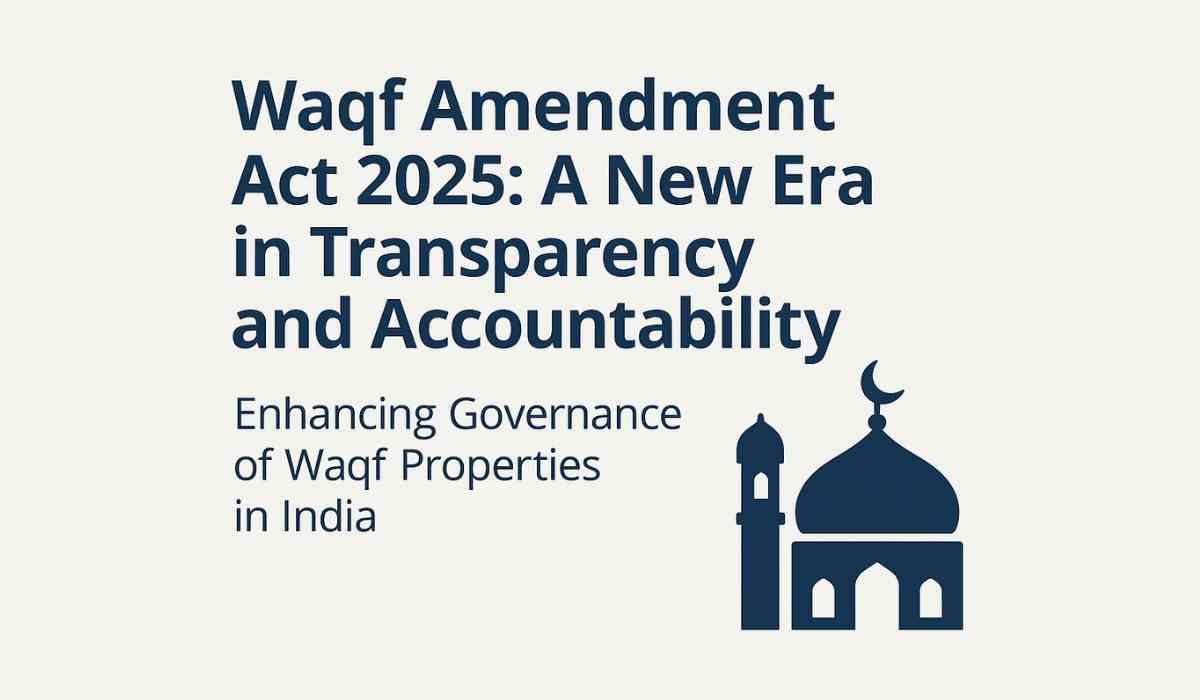Today, April 9, 2025, marks a significant day for the management of Waqf properties in India as the Waqf Amendment Act, 2025, comes into effect. This new law aims to bring about substantial reforms in the administration of Waqf assets, which are properties dedicated for charitable or religious purposes under Islamic law. The enforcement of this Act follows a series of legislative steps, including its passage by both houses of Parliament and the President's assent.

Background and Legislative Process
The Waqf (Amendment) Bill, 2024 was first introduced in the Lok Sabha on August 8, 2024. It was referred to a Joint Parliamentary Committee for review, which included members from both the Lok Sabha and the Rajya Sabha. After extensive deliberations, the Bill was passed by the Lok Sabha on April 3, 2025, and by the Rajya Sabha on April 4, 2025. President Droupadi Murmu gave her assent to the Bill on April 5, 2025, paving the way for its enforcement.
Key Reforms Introduced by the Act
The Waqf Amendment Act, 2025, introduces several key changes to the original Waqf Act of 1995:
-
Separation of Trusts from Waqf Entities: The Act clarifies that trusts created by Muslims under any law will no longer be considered Waqf. This ensures that individuals retain full control over their trusts and the management of their assets.
-
Modernization with Technology: The use of digital tools is a significant aspect of the reforms. A centralized online portal will be established to automate the management of Waqf properties, including registration, accounts, audits, contributions, and litigation. This aims to make the process more efficient, transparent, and accountable.
-
Restriction on Waqf Dedication: Only individuals who have been practicing Islam for at least five years will be allowed to dedicate their property to Waqf. This provision restores the conditions that existed before the Waqf (Amendment) Act, 2013.
-
Protection of Waqf by User Properties: The Act ensures that existing Waqf by User properties remain intact unless they are disputed or identified as government land. This protects community-used properties that have historical significance.
-
Recognition of Women's Rights: The Act includes provisions to protect women's inheritance rights in family Waqf arrangements, ensuring that they are not denied their rightful share.

Perspectives and Controversies
While the government views the Waqf Amendment Act as a step towards modernizing and streamlining the management of Waqf properties, it has faced significant opposition from various Muslim organizations and opposition parties. Critics argue that the Act infringes upon the religious rights of Muslims and could be used to further a polarizing agenda.
Several petitions have been filed in the Supreme Court challenging the constitutional validity of the Act. These legal challenges reflect the deep-seated concerns within the Muslim community regarding the potential impact of the Act on their religious and cultural practices.
Future Implications
The enforcement of the Waqf Amendment Act, 2025, marks a new chapter in the management of Waqf properties in India. While the government aims to enhance transparency and accountability, the Act's implementation will be closely watched by both supporters and critics.
As the Supreme Court prepares to hear the petitions challenging the Act, it remains to be seen how these legal proceedings will shape the future of Waqf management in India. The government's efforts to modernize and streamline Waqf administration will need to balance the need for efficiency with the concerns of the Muslim community regarding their religious and cultural heritage.
In conclusion, the Waqf Amendment Act, 2025, represents a significant shift in the governance of Waqf properties. Its impact will depend on how effectively it addresses the concerns of all stakeholders while ensuring that the management of these properties aligns with the principles of transparency, accountability, and respect for religious traditions.

Frequently Asked Questions (FAQs)
-
What is the Waqf Amendment Act, 2025?
-
The Waqf Amendment Act, 2025, is a law that aims to reform the administration of Waqf properties in India. It introduces several changes to enhance transparency and accountability in the management of these properties.
-
-
What are the key reforms introduced by the Act?
-
Key reforms include separating trusts from Waqf entities, using digital tools for property management, restricting Waqf dedication to practicing Muslims, protecting Waqf by User properties, and recognizing women's rights in family Waqf arrangements.
-
-
Why is the Act controversial?
-
The Act is controversial because it has faced opposition from Muslim organizations and opposition parties, who argue that it infringes upon religious rights and could be used to further a polarizing agenda.
-
-
What legal challenges does the Act face?
-
Several petitions have been filed in the Supreme Court challenging the constitutional validity of the Act. These challenges reflect concerns about the Act's impact on religious and cultural practices.
-
-
How will the Act affect Waqf management in India?
-
The Act aims to modernize Waqf management by enhancing transparency and accountability. However, its impact will depend on how effectively it addresses the concerns of all stakeholders while respecting religious traditions.
-
With inputs from agencies
Image Source: Multiple agencies
© Copyright 2025. All Rights Reserved Powered by Vygr Media.























